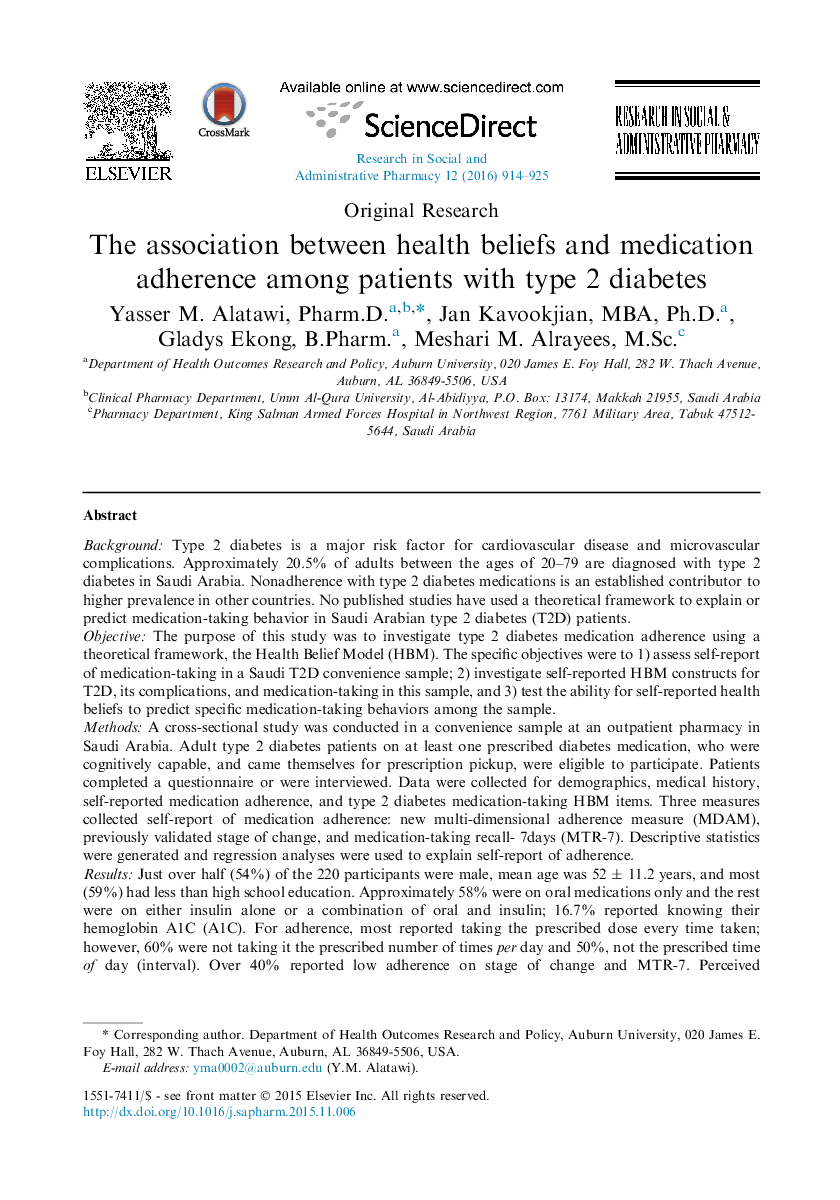| کد مقاله | کد نشریه | سال انتشار | مقاله انگلیسی | نسخه تمام متن |
|---|---|---|---|---|
| 5551414 | 1402947 | 2016 | 12 صفحه PDF | دانلود رایگان |
BackgroundType 2 diabetes is a major risk factor for cardiovascular disease and microvascular complications. Approximately 20.5% of adults between the ages of 20-79 are diagnosed with type 2 diabetes in Saudi Arabia. Nonadherence with type 2 diabetes medications is an established contributor to higher prevalence in other countries. No published studies have used a theoretical framework to explain or predict medication-taking behavior in Saudi Arabian type 2 diabetes (T2D) patients.ObjectiveThe purpose of this study was to investigate type 2 diabetes medication adherence using a theoretical framework, the Health Belief Model (HBM). The specific objectives were to 1) assess self-report of medication-taking in a Saudi T2D convenience sample; 2) investigate self-reported HBM constructs for T2D, its complications, and medication-taking in this sample, and 3) test the ability for self-reported health beliefs to predict specific medication-taking behaviors among the sample.MethodsA cross-sectional study was conducted in a convenience sample at an outpatient pharmacy in Saudi Arabia. Adult type 2 diabetes patients on at least one prescribed diabetes medication, who were cognitively capable, and came themselves for prescription pickup, were eligible to participate. Patients completed a questionnaire or were interviewed. Data were collected for demographics, medical history, self-reported medication adherence, and type 2 diabetes medication-taking HBM items. Three measures collected self-report of medication adherence: new multi-dimensional adherence measure (MDAM), previously validated stage of change, and medication-taking recall- 7days (MTR-7). Descriptive statistics were generated and regression analyses were used to explain self-report of adherence.ResultsJust over half (54%) of the 220 participants were male, mean age was 52 ± 11.2 years, and most (59%) had less than high school education. Approximately 58% were on oral medications only and the rest were on either insulin alone or a combination of oral and insulin; 16.7% reported knowing their hemoglobin A1C (A1C). For adherence, most reported taking the prescribed dose every time taken; however, 60% were not taking it the prescribed number of times per day and 50%, not the prescribed time of day (interval). Over 40% reported low adherence on stage of change and MTR-7. Perceived susceptibility, perceived medication benefits, and self-efficacy were significant HBM predictors for medication adherence (R2 = 0.42).ConclusionsThe MDAM has research and practice potential because it evaluates sub-behaviors of medication-taking separately and as a score. Patient perceptions and beliefs should be assessed as part of a patient-centered medication adherence intervention.
Journal: Research in Social and Administrative Pharmacy - Volume 12, Issue 6, NovemberâDecember 2016, Pages 914-925
